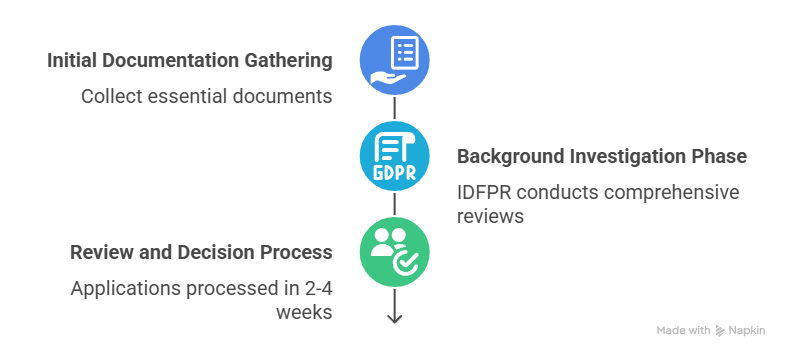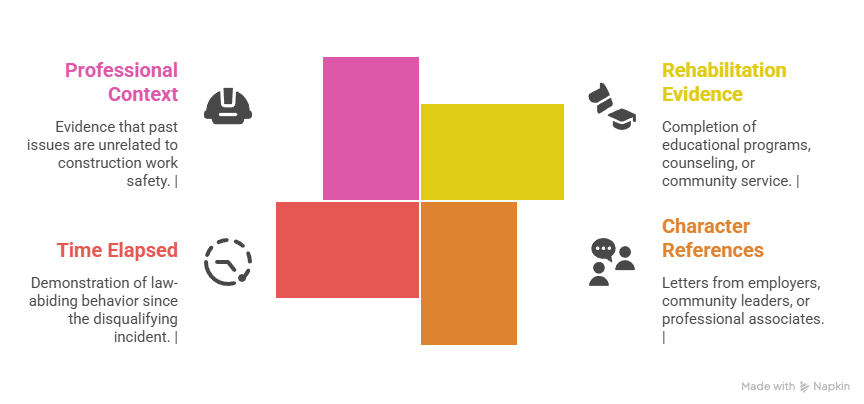Illinois construction background checks are mandatory screening processes administered by the Illinois Department of Financial and Professional Regulation (IDFPR). These screenings ensure worker safety, licensing compliance, and adherence to prevailing wage requirements on public projects. The comprehensive evaluations examine criminal history, employment records, professional qualifications, and financial responsibility. They maintain industry standards and protect public interests.
Key Takeaways
- Illinois construction background checks are required for all licensed contractors, individual workers, and personnel on public construction projects to ensure safety and regulatory compliance.
- The Illinois Department of Financial and Professional Regulation (IDFPR) conducts thorough evaluations. Furthermore, these include criminal history reviews with a seven-year lookback period, employment verification, and professional qualification assessments.
- Licensed contractors, specialty contractors, skilled tradespeople, equipment operators, supervisors, and apprentices must undergo background screenings to maintain industry standards.
- The Illinois Prevailing Wage Act requires additional background check compliance for public construction projects to guarantee fair wages and working conditions.
- Background check processes typically take 2-4 weeks. Additionally, they include appeals procedures for applicants who face disqualification due to past convictions or other factors.
- Employers must maintain detailed compliance records, implement FCRA-compliant screening programs, and utilize digital solutions to streamline background check management and renewal processes.
Understanding Illinois Construction Background Check Requirements
What Illinois Construction Background Checks Include
An Illinois construction background check is a comprehensive evaluation conducted by the Illinois Department of Financial and Professional Regulation (IDFPR). The screening ensures construction industry professionals meet state safety and professional standards. This rigorous process examines multiple aspects of an applicant's history. It determines eligibility for licensing and employment opportunities. The screening process serves as a critical safeguard. Therefore, it protects both workers and the general public on construction sites.
The background check process encompasses several key components. These provide a complete picture of an applicant's qualifications:
| Component | Description | Lookback Period |
| Criminal History | Felonies and misdemeanors related to construction fraud or safety | 7 years |
| Employment Verification | Previous job roles, responsibilities, and performance | Varies by employer |
| Education Credentials | Degrees, certifications, and professional training | No time limit |
Criminal history reviews focus specifically on offenses that could impact job site safety or professional integrity. Meanwhile, employment verification ensures applicants have relevant experience. Additionally, it demonstrates their work history reliability. Furthermore, educational verification confirms that claimed qualifications are legitimate and current. For instance, this includes construction management degrees or trade certifications.
Who Must Complete Background Checks
Illinois construction background check requirements apply to a broad range of industry professionals. Notably, they work on both private and public projects. Therefore, understanding who needs these screenings helps ensure compliance. Additionally, it prevents project delays. Moreover, the scope includes both licensed contractors and individual workers. As a result, this covers all construction trades and specialties.
Licensed contractors subject to background checks include:
- General contractors: Managing overall project coordination and subcontractor oversight
- Specialty contractors: Focusing on specific trades like electrical, plumbing, or HVAC systems
- Home improvement contractors: Performing residential renovation and repair work
Individual construction workers requiring background checks encompass skilled tradespeople, equipment operators, supervisors, and apprentices. Public construction projects under the Illinois Prevailing Wage Act have additional screening requirements. These ensure fair wage practices and working conditions compliance.
Illinois Department of Financial and Professional Regulation (IDFPR) Standards
The Illinois Department of Financial and Professional Regulation oversees construction licensing throughout the state. It establishes comprehensive standards that protect public safety and maintain industry integrity. IDFPR's background check requirements ensure that only qualified, trustworthy professionals receive construction licenses. They work on critical infrastructure projects. The department's rigorous evaluation process examines criminal history, employment background, educational qualifications, and financial responsibility. This makes informed licensing decisions.
Financial responsibility assessment plays a crucial role in IDFPR evaluations. Contractors must demonstrate their ability to manage significant financial obligations. These are associated with construction projects. Applicants with histories of business bankruptcy, unpaid debts, or financial mismanagement may face additional scrutiny. They may need additional requirements before receiving licenses. This financial vetting protects consumers. It ensures contractors can complete their contractual obligations.
License Application Process Steps
The IDFPR license application process follows a structured timeline. It's designed to thoroughly evaluate each applicant's qualifications and background. Applicants must gather comprehensive documentation before beginning the process. This avoids delays and ensures successful completion. The multi-step process typically takes 4-8 weeks from initial submission to final approval. This depends on the complexity of the applicant's background.
Initial application submission requires detailed personal information, professional qualifications, and supporting documentation. Applicants must provide valid identification, social security verification, and proof of relevant certifications or training. The background investigation phase involves IDFPR contacting former employers, educational institutions, and professional references. This verifies submitted information.
Following documentation review, applicants may need to complete written examinations. These test their knowledge of construction standards, safety regulations, and Illinois-specific requirements. Upon successful completion of all requirements, IDFPR issues the construction license. This marks the final step toward becoming a licensed professional in Illinois.
Renewal and Continuing Education Requirements
Illinois construction licenses require annual renewal to maintain active status. This ensures ongoing compliance with evolving industry standards. The renewal process includes updated background checks, continuing education completion, and current insurance documentation submission. License holders must stay current with educational requirements. These may include courses on new construction techniques, safety protocols, or regulatory changes.
Continuing education requirements vary by license type. They typically range from 10-20 hours annually. These courses can often be completed online or through industry workshops and seminars. Topics focus on current building codes, safety practices, environmental regulations, and emerging construction technologies.
Renewal documentation must include proof of current insurance coverage and bonding. This is required by IDFPR standards. Maintaining these financial protections ensures continued compliance. It protects both contractors and their clients throughout the license period.
Illinois Prevailing Wage Act Compliance Requirements
Prevailing Wage Standards for Public Projects
The Illinois Prevailing Wage Act establishes mandatory wage rates for construction workers on public projects. This ensures fair compensation that reflects local market standards for similar work. These rates are determined by the Illinois Department of Labor. They're updated regularly to reflect current market conditions across different counties and construction trades. Contractors working on government-funded projects must pay wages that meet or exceed these established rates. These vary significantly by geographic location and specialty.
Prevailing wage rates encompass both hourly wages and fringe benefits. These include health insurance, retirement contributions, and other compensation packages. The Department of Labor publishes detailed wage schedules for each county. They cover dozens of construction classifications from general laborers to specialized equipment operators. Staying informed about these rate changes is essential for maintaining compliance. It avoids costly penalties.
Compliance extends beyond wage payments to include detailed record-keeping requirements. Contractors must maintain comprehensive documentation. This shows each worker's classification, hours worked, wages paid, and benefit contributions. These records must be preserved for at least three years. They must be made available for inspection by Department of Labor representatives during compliance audits.
Enhanced Background Check Integration
Enhanced screening procedures for prevailing wage projects require additional verification beyond standard background checks. This ensures full compliance with federal and state labor regulations. Work authorization verification confirms that all employees are legally eligible to work in the United States. Skill verification ensures workers possess the necessary qualifications for their assigned roles. Drug testing, while not always mandatory, provides an additional safety measure for high-risk construction environments.
Background check integration with prevailing wage compliance creates a comprehensive screening framework. This addresses both worker qualifications and legal employment requirements:
- Work Authorization: I-9 verification and E-Verify compliance for all project personnel
- Skill Verification: Certification and training documentation for specialized roles
- Safety Compliance: OSHA training verification and safety certification status
- Wage Classification: Proper job classification to ensure accurate prevailing wage payment
Employers must verify that screening methods align with current state and federal regulations to avoid compliance violations. Regular updates to screening procedures help maintain effectiveness and ensure continued adherence to evolving legal requirements.
Background Check Process for Construction Workers
Step-by-Step Application Procedures
The Illinois construction background check process begins with comprehensive document preparation and submission. This ensures efficient processing and avoids unnecessary delays. Applicants must gather all required documentation before starting the process. This includes government-issued identification, professional certifications, and employment history records. Proper preparation significantly reduces processing time. It increases the likelihood of successful completion.
The application process follows these essential steps:

Initial Documentation Gathering: Collect driver's license or state ID, Social Security card, professional licenses, training certificates, and employment records. Ensure all documents are current and legible to prevent processing delays.
Background Investigation Phase: IDFPR conducts comprehensive reviews of criminal history, employment records, and educational background. This phase may involve contacting former employers, schools, or training institutions for verification purposes.
Review and Decision Process: Applications typically require 2-4 weeks for complete processing, though complex cases may take longer. Applicants receive notification of approval or any issues requiring additional documentation or explanation.
Required Documentation Checklist
Proper documentation ensures smooth background check processing and demonstrates applicant qualifications effectively. Missing or incomplete paperwork represents the most common cause of application delays and potential rejections. Applicants should verify document completeness and accuracy before submission to avoid processing complications.
Essential documentation includes personal identification proving identity and work eligibility in the United States. Professional qualifications documentation encompasses all relevant certifications, licenses, training records, and educational transcripts. Financial documentation demonstrates responsibility and includes proof of insurance coverage and bonding as required for specific license types.
Each document serves a specific verification purpose, confirming identity, validating qualifications, and demonstrating financial accountability. Outdated or missing paperwork can significantly delay the application process, making thorough preparation essential for timely completion.
Common Disqualifying Factors and Appeals
Background check disqualifications typically result from recent criminal convictions. These particularly involve fraud, safety violations, or other offenses directly related to construction work responsibilities. Felony convictions within the past seven years often result in automatic disqualification. However, the appeals process provides opportunities for applicants to present mitigating circumstances. Safety violations involving personal injury or negligence on previous job sites represent another common disqualification factor.
Illinois law provides appeal procedures for applicants facing disqualification. This is due to past convictions or other adverse findings. The appeals process allows applicants to present evidence of rehabilitation, character references, or other mitigating factors. These may overcome initial disqualification decisions:

- Rehabilitation Evidence: Completion of educational programs, counseling, or community service
- Character References: Letters from employers, community leaders, or professional associates
- Time Elapsed: Demonstration of law-abiding behavior since the disqualifying incident
- Professional Context: Evidence that past issues are unrelated to construction work safety
Appeals require formal submission with supporting documentation. They may include hearings where applicants can present their cases directly to IDFPR representatives. Understanding appeal rights and procedures can help transform initial setbacks into successful licensing outcomes.
Compliance Best Practices for Employers
Construction employers must implement comprehensive screening programs. These comply with both state regulations and federal Fair Credit Reporting Act (FCRA) requirements. This makes informed hiring decisions while respecting applicant privacy rights. Effective programs integrate criminal background checks, employment verification, and education credential validation. They create streamlined processes that protect both employers and applicants. Regular program updates ensure continued compliance with evolving legal requirements and industry best practices.
Ongoing monitoring systems help maintain compliance throughout the employment relationship. They track certification renewals, license expirations, and other important dates that affect worker eligibility. Digital platforms designed specifically for construction industry compliance can automate administrative tasks. They organize documentation and provide real-time alerts for important deadlines. These technological solutions reduce administrative burden. They improve accuracy and compliance effectiveness.
Record-keeping requirements mandate detailed documentation of all screening activities. Secure storage systems protect sensitive employee information from unauthorized access. Employers must maintain screening records throughout employment and for specified periods following termination. This complies with state and federal retention requirements. Regular audits of record-keeping systems help identify potential gaps. They ensure continued compliance with all applicable regulations.
Conclusion
Illinois construction background checks represent essential safeguards that protect industry integrity. They ensure qualified professionals contribute to safe, compliant project environments. The comprehensive screening process administered by IDFPR creates accountability standards. These benefit workers, employers, and the general public through thorough evaluation of criminal history, professional qualifications, and financial responsibility. Successful navigation of these requirements requires careful preparation, attention to detail, and understanding of both licensing standards and prevailing wage compliance obligations. By embracing proactive compliance approaches and utilizing available technological solutions, construction professionals can efficiently meet these requirements. They can build successful careers in Illinois's dynamic construction industry.
Frequently Asked Questions
What is the timeline and cost for Illinois construction background checks?
Background checks typically take 2-4 weeks to complete, depending on the complexity of the applicant's history and responsiveness of verification sources. Costs range from $50-$150, though employers cannot require applicants to pay background check fees under Illinois law. Processing time may extend for applicants with extensive work histories or those requiring additional verification.
What information appears in Illinois construction background checks?
Standard background checks include criminal records (7-year lookback), employment history verification, education credential confirmation, and professional license validation. Specific screenings may also include financial responsibility assessments, professional references, and trade-specific certification verification depending on the position and project requirements.
Can construction workers continue employment while background checks are pending?
This depends on employer policies and project requirements. Some employers allow conditional employment pending background check completion, while others require full clearance before beginning work. Public projects under the Prevailing Wage Act typically require completed background checks before workers can start on-site activities.
When are background checks mandatory in Illinois construction?
Background checks are required for all construction license applicants, individuals working on public projects subject to prevailing wage requirements, and positions with heightened safety or security responsibilities. Private employers may also require background checks as part of their hiring processes, subject to state and federal fair hiring regulations.
How do employers implement compliant screening programs?
Effective screening programs must comply with FCRA guidelines, state ban-the-box legislation, and anti-discrimination laws. Programs should include clear policies, proper applicant notifications, secure record-keeping systems, and regular updates to maintain compliance with evolving regulations. Digital platforms can help streamline processes while ensuring proper documentation and deadline management.
What are the appeal options for background check disqualifications?
Applicants facing disqualification can appeal IDFPR decisions by submitting formal requests with supporting documentation demonstrating rehabilitation, character references, or mitigating circumstances. The appeals process may include hearings where applicants present their cases directly to department representatives. Understanding appeal rights and procedures provides opportunities to overcome initial adverse decisions.
Additional Resources
- Illinois Department of Financial and Professional Regulation (IDFPR) Official Website
https://idfpr.illinois.gov/ - Illinois Department of Labor - Prevailing Wage Information
https://www2.illinois.gov/idol/Laws-Rules/FLS/Pages/prevailing-wage-act.aspx - Fair Credit Reporting Act (FCRA) Compliance Guidelines
https://www.ftc.gov/business-guidance/resources/using-consumer-reports-what-employers-need-know - Illinois Construction Industry Licensing Board Resources
https://idfpr.illinois.gov/profs/construction.asp - Background Check Compliance Best Practices Guide
https://www.eeoc.gov/newsroom/eeoc-enforcement-guidance-consideration-arrest-and-conviction-records-employment
Still have questions?
Get in touch with our team today for a personalized demo and discover how our tailored volume pricing and packages can drive results for your business!
How useful was this page?*
Note: your comments are anonymous. We use them to improve the website. Do not include any personal details.
Visit our FCRA Compliance Tool or leave a message here if you need a response.
From the blog Explore the GCheck Content Hub

How Long Does a Background Check Take? A Complete 2025 Guide
13 Dec, 2023 • 14 min read
The Ultimate Background Check Guide
13 Dec, 2023 • 4 min read
The Ultimate Guide to Employment Background Checks
13 Dec, 2023 • 10 min readThe information provided in this article is for general informational and educational purposes only and should not be construed as legal advice or a substitute for consultation with qualified legal counsel. While we strive to ensure accuracy, employment screening laws and regulations—including but not limited to the Fair Credit Reporting Act (FCRA), Equal Employment Opportunity Commission (EEOC) guidelines, state and local ban-the-box laws, industry-specific requirements, and other applicable federal, state, and local statutes—are subject to frequent changes, varying interpretations, and jurisdiction-specific applications that may affect their implementation in your organization. Employers and screening decision-makers are solely responsible for ensuring their background check policies, procedures, and practices comply with all applicable laws and regulations relevant to their specific industry, location, and circumstances. We strongly recommend consulting with qualified employment law attorneys and compliance professionals before making hiring, tenant screening, or other decisions based on background check information.

